PSYC Honors Program
Overview
The PSYC Honors Program allows exceptional students to collaborate directly with a faculty mentor to complete an original research project. This engagement fosters an intellectual culture in our department in which faculty members mentor the next generation of scholars to conduct research that advances knowledge in psychology and contributes to the betterment of our world. Results from honors projects have been reported in scientific journals and presented at professional conferences.
PSYC Honors includes two terms of independent study courses with the mentor (PSYC468H, PSYC469H, and PSYC499H), culminating in a written thesis report and a poster presentation. Successful program participants are awarded an honors designation at graduation (B.S. degree “with honors”).
At large, the PSYC Honors Program has the following goals:
- Educate students to think independently as scholars in their field
- Provide opportunities for close, scholarly, and scientific analysis of significant topics in psychology
- Encourage and provide opportunities for students to undertake independent research
- Introduce students to a broad range of psychological ideas and issues.
All psychology majors have the opportunity to graduate with the distinction of Honors in Psychology.
Benefits of the Program
Honors students may take graduate courses and apply the credits toward their undergraduate degree. However, in order to take a graduate course, the student must get special permission from both the Director of Undergraduate Studies in the Department of Psychology and the Assistant Dean in BSOS. Students have access to the upper level General Honors seminars and many of the General Honors functions. Honors students may establish their own internships under supervision of the Department of Psychology and receive Honors credit.
Eligibility Criteria
Psychology majors may apply at the end of their sophomore year or during their junior year, but no later than their sixth semester of undergraduate study.
Applicants must have:
- Completed three courses (9 credits) in psychology, including PSYC 200
- An overall and psychology GPA of at least 3.50
- An interest in and commitment to research in psychology
Requirements for Completion of the Honors Program
To graduate with Honors in Psychology, students accepted into the program must:
- Complete the requirements for a Bachelor of Science (B.S.) in psychology
- Complete an undergraduate honors thesis (PSYC468H, PSYC469H, and PSYC499H)
- Complete two PSYC honors seminars including PSYC498H
- Complete an additional advanced PSYC course (another PSYC honors seminar, another 400-level PSYC lab, or any 600-level PSYC course)
- PSYC 400 level course in each Theme
- Maintain a 3.50 UMD GPA (both cumulative and in psychology) for Honors
- Earn a 3.80 UMD GPA (both cumulative and in psychology) for High Honors, in addition to completing an honors thesis of exceptionally high quality as determined by the thesis committee
- Be actively involved in leadership or volunteerism in our department, university and/or community (e.g., assist with Welcome to PSYC Day, volunteer with BSOS or in the community)
- Present thesis poster at the Department of Psychology Undergraduate Research Day
- Join Psi Chi International Honors Society for Psychology for at least senior year
Honors Coursework
|
|
||
|
|
|
|
|
|
||
|
|
||
|
|
|
|
|
|
||
|
|
|
|
|
|
||
|
|
||
|
|
|
|
|
|
|
|
|
|
||
|
|
||
|
|
|
|
|
|
||
|
|
||
|
|
||
|
|
||
|
|
||
|
|
||
|
|
||

To apply to the Psychology Honors Program, download and submit the application from our Honors Forms page. Meeting all requirements does not guarantee admission. Only the top applicants, as determined by the Honors Director, will be admitted into the PSYC Honors Program. If you have any questions about the Honors in Psychology Program, please feel free to contact the Department of Psychology’s Office of Undergraduate Studies at (301) 405-5866 or PSYCadvising@umd.edu.
Apply By Nov. 15th!
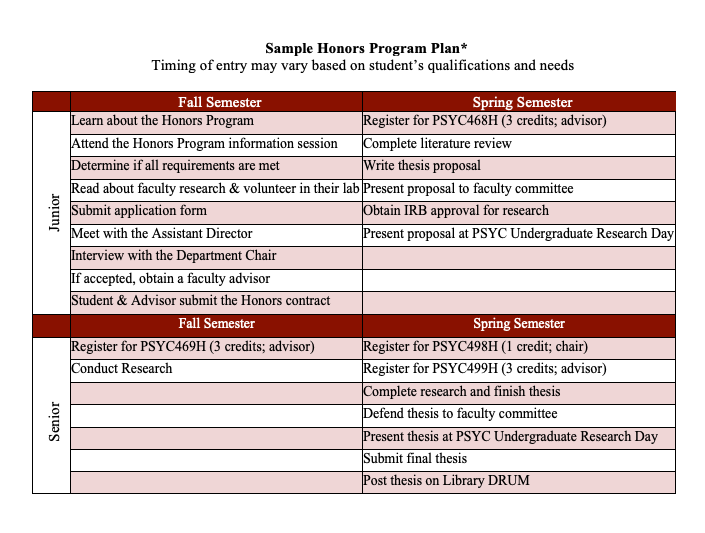
WHAT IS AN HONORS THESIS?
The Undergraduate Honors thesis is an original, independent undergraduate research project carried out under the guidance of a faculty member in the Department of Psychology who serves as the student’s advisor. The thesis research explores a concept or problem within psychology in depth, includes a study that uses knowledge gained in undergraduate coursework, furthers understanding of a salient topic in psychology, and culminates in a substantial research paper. The thesis requires at least three semesters of focused work. The thesis forms a significant part of the student's Honors Program experience and is conducted under close supervision from the advisor. Example theses can be found at the following link (https://drum.lib.umd.edu/handle/1903/25221).
WHO SERVES AS HONORS THESIS ADVISORS AND COMMITTEE MEMBERS?
The Honors thesis advisor must be a faculty member in the Department of Psychology (tenure/tenure track or professional track). The theses of undergraduate Honors students may not be supervised by graduate students, post-doctoral researchers or non-members of the Department of Psychology faculty.
The Honors Thesis Committee consists of three faculty members in the Department of Psychology. Students may petition the chair of the Department of Psychology to request that one of the committee members be a faculty member from outside of our department. Students should submit a written petition to the chair three weeks in advance of their proposal meeting with the rationale for including a faculty member outside of the department on the committee.
LEARNING OBJECTIVES
- Describe key concepts, principles, and overarching themes related to a research topic
- Engage in innovative and integrative thinking to develop and implement a study
- Design, conduct, analyze, and interpret psychological research
- Understand and follow ethical practices in scientific research
- Engage in statistical analyses
- Use scientific reasoning to interpret psychological phenomena
- Demonstrate effective communication and writing related to research
- Present research findings (to advisor, committee and Psychology community)
WHAT IS THE PROCESS FOR COMPLETING AN HONORS THESIS?
Students work with their advisor to identify a topic of interest and together, they decide on the research design for the study. The student writes a thesis proposal that consists of the following sections: Introduction, Literature Review, Method, and References. It is expected that the advisor provides edits and the student revises the proposal based on the suggestions from the advisor. Once the advisor approves the proposal, the student must present the proposal to the Honors Thesis Committee.
The student schedules a 1-hour meeting during which time the student gives a 10 to 15 minute presentation describing the research and then answers questions from the faculty. Each committee member independently votes whether the student passes (meets expectations) or does not pass (does not meet expectations) the proposal meeting. The student passes if they receive two or more passing votes.
After the meeting, the advisor submits the Thesis Proposal Meeting Form to the Assistant Director. If the student passes the meeting, the student makes edits based on committee feedback. After completing requested edits and receiving final approval of the proposal from the advisor, the student submits a proposal to obtain approval from the University of Maryland Institutional Review Board Human Subjects Committee or Animal Care Committee. Once the proposal is approved by the IRB, the student begins the research project.
If the student does not pass the meeting (receives two or more does not pass votes), the student has four weeks to make edits and hold a second proposal meeting. If the student does not pass this meeting, their participation in the Honors Program is terminated.
The thesis consists of the following sections: Introduction, Literature Review, Method, Results, Discussion, and References. After the advisor determines that the thesis is ready for review, the final thesis must be presented to the Honors Thesis Committee. The student schedules a 1-hour defense meeting during which time the student gives a 10 to 15 minute presentation describing the research and then answers questions from the faculty. The committee should receive the written thesis two weeks prior to the defense meeting. Students must defend their thesis no later than the last day of classes in the semester in which they plan to graduate.
In evaluating the written thesis, the Thesis Committee weighs (a) how well the student places the research into the context of the relevant literature; (b) the clarity and originality of the study design; (c) the relevance of the statistical design and analysis; and (d) the student's interpretation and integration of findings within the research and theoretical literature in psychology. Similar criteria are used to judge performance in the oral examination. Each committee member independently votes whether the student passes (meets expectations) or does not pass (does not meet expectations) the proposal meeting. The student passes if they receive two or more passing votes.
After the meeting, the advisor submits the Psychology Honors Program Thesis Defense Form to the Associate Director, Undergraduate Studies. Often, edits are needed prior to submission of the final thesis. If the thesis is approved, the advisor submits the thesis and the Final Thesis Approval Form to the Associate Director. In addition, students are asked to upload their thesis on the library repository (DRUM). When the thesis is ready to upload, the students should send an email message to drum-help@umd.edu and the staff will assist the student in uploading their thesis. Please note that the final thesis must be approved by the advisor and submitted to the Associate Director prior to spring graduation.
If the thesis is not approved, the student has the opportunity to make edits and schedule a second defense of their thesis to the Honors Thesis Committee within one month of the defense meeting. If the student does not pass on the second attempt, participation in the Honors Program is terminated. No credit will be received for participation in the Honors Program if the student does not successfully defend the thesis.
PSYC Honors Alumni
Lucas Guberman - Social Psychology PhD student at Florida State University studying the influence of stigma and prejudice on intergroup relations.
Kyaw Thirein - Study Coordinator @ Georgetown University Medical Center
Sonya Leikin - POLER Lab Clinical Research Coordinator, Children's National Hospital
Sarah Nelson - Psychology Research Project Coordinator, University of Pittsburgh
Deanna Sarlak
Eric Shi - Research Analyst
Hannahlise Wang - Postgraduate Associate at the Yale Anxiety and Mood Disorders Program
PSYC Honors Alumni Spotlight
Jonathan Booker: "Hippocampal volume, caregiver changes, and family cohesion in adolescents with prenatal drug exposure"
Faculty Mentor: Dr. Tracy Riggins
Damiana Colley: "Violence Against Native Populations in the United States: Human Trafficking, Generational Trauma, Systemic Inequities and the Contributing Factors"

Naru Kang: "An Examination of the Impact of Childhood Abuse on Asian Americans’ Alcohol-Related Problems, as Moderated by Resilience"
Faculty Mentor: Dr. Cristina Risco
Asian Americans have traditionally been vastly underrepresented in substance use research due to the "model minority" myth, which is the perception of Asian Americans as being more economically and educationally successful than other people of color. This stereotype is harmful as it disparages the hardships & struggles of Asian Americans and alienates them from other people of color, and is part of the reason why the literature on substance use in Asian Americans is so sparse. An understudied yet relevant factor in the study of alcohol-related problems is childhood trauma, which may extend to hazardous alcohol use behaviors through a mechanism of drinking to cope under the self-medication hypothesis. Ultimately, Naru's thesis intends to assess how childhood trauma impacts alcohol-related problems in Asian Americans, and how resilience moderates this relationship. The purpose of this study is to identify whether resilience can serve as a protective factor against alcohol-related problems in Asian Americans with childhood trauma, which may have clinical implications in treatments for alcohol use disorder in Asian American patients.
 Holly Stewart: Predictors of Bystander Intervention in Online LGBTQ+ Discrimination
Holly Stewart: Predictors of Bystander Intervention in Online LGBTQ+ Discrimination
Faculty Mentor: Dr. Edward Lemay
With the ever-growing presence of social media in people’s lives, it is more important than ever to examine its impact on people’s well-being. Members of the LGBTQ+ community are particularly likely to be the victims of prejudice, harassment, and discrimination online. Although bystander intervention had played an important role in reducing the frequency and harmfulness of violence and discrimination in other contexts, little is known about the predictors of bystander intervention in online LGBTQ+ discrimination. Guided by research on bystander intervention and perceptions of discrimination, the current research will examine a variety of predictors of actual and self-reported helping behavior, such as personal identities, connections to the LGBTQ+ community, attitudes towards LGBTQ+ individuals, perceptions of discrimination norms, and anticipated personal costs and benefits. Overall, this research aims to identify potential predictors of bystander intervention in the context of online LGBTQ+ discrimination, which may be useful for future intervention efforts.
 Sophia Shaw: “How Therapists Respond to Questions and Requests in Psychodynamic Psychotherapy”
Sophia Shaw: “How Therapists Respond to Questions and Requests in Psychodynamic Psychotherapy”
Faculty Mentor: Dr. Clara E. Hill
Hanna-Sophia Shine: “The Influence of Accent Prestige on Lexical and Structural Alignment in Dialogue”
Faculty Mentor: Dr. Robert Slevc
Alignment is a phenomenon we have all engaged in. It occurs when a speaker “adopts” a linguistic aspect used by their interlocutor (Pickering & Garrod, 2004; Foltz, 2015). This essentially means that the conversational parties align through lexical terminology, syntactic form, or at another level such as phonetically. Current theories in psycholinguistics regarding linguistic alignment center around the idea that alignment occurs as a way of facilitating communication between two parties (Chun et al., 2016). It has also been theorized that alignment is a reflection of how a speaker views their interlocutor and is therefore dependent on situational cues and social factors. Research into this question has explored various social factors that influence a speaker’s tendency to align - including the perceived intelligence of the interlocutor, the prestige associated with the interlocutor’s class ranking, as well as other social factors such as the interlocutor’s relative status within a social setting (Lev-Ari, 2015; Chun et al., 2016). The purpose of Hanna-Sophia’s study is to explore the influence of accent prestige on the frequency of lexical and syntactic alignment in conversations between a foreign-accented English speaker and a native English speaker.
 Madelyn Harris: "Black Grief Matters: Disenfranchisement, Social Support, and Coping Among Black College Students Grieving the Deaths of Black Americans by Police Brutality"
Madelyn Harris: "Black Grief Matters: Disenfranchisement, Social Support, and Coping Among Black College Students Grieving the Deaths of Black Americans by Police Brutality"
Faculty Mentor: Dr. Karen O’Brien
Black Americans are nearly three times more likely than their white American counterparts to be killed by police, accounting for over 40% of the victims of police killings nationwide (Bor et al., 2018). Ubiquitous access to social media and news platforms facilitates widespread viewing and sharing of police brutality against Black Americans, and exposure to this violence is associated with negative mental health outcomes among Black Americans including heightened stress, depression, and grief and loss reactions (Allen & Solomon, 2016; Bor et al., 2018). Factors which may contribute to these negative mental health outcomes include disenfranchisement of grief (i.e., the grief not being recognized or acknowledged; Piazza-Bonin et al., 2015), the absence of social support during grieving (Burke et al., 2010; Stroebe et al., 2005), and the ways in which college students cope with these killings and their grief (Andersen et al., 2013; Fox-Williams, 2019). Informed by the multidimensional model of racism-related stress (Harrell, 2000), the biopsychosocial model of perceived racism (Clark et al., 1999), and the cognitive theory of stress and coping (Folkman et al., 1986), Madelyn's study examined how grief disenfranchisement, social support and coping style predict stress, depressive symptoms, and prolonged grief in Black college students (n = 194) as they respond to deaths by the police brutalization of Black Americans.
Holly Liposky: "Advice-Giving in Final Sessions of Psychodynamic Psychotherapy: Is it Advised?"
Faculty Mentor: Dr. Clara Hill
Here’s a riddle: “Almost everyone needs it, asks for it, gives it, but almost nobody takes it. What is it? Answer: Advice.” (Roman, 2019, p. 99). Indeed, when people have problems, they frequently seek out advice from family, friends, and advice columnists. Similarly, when clients go to therapy, they frequently expect therapists to give them ideas about what to do differently so that they can feel better and function better in everyday life (Duan et al., 2018). Holly's study examines what effect advice can have within the therapeutic process and whether or not some kinds of advice are better than others.
 M Pease: "Title: Gender Minority Young Adult Mental Health: Anti-Transgender Prejudice, Mediators, and Implications in the COVID-19 Era"
M Pease: "Title: Gender Minority Young Adult Mental Health: Anti-Transgender Prejudice, Mediators, and Implications in the COVID-19 Era"
Faculty Mentor: Dr. Derek Iwamoto
Binary and non-binary transgender young adults exist in a state of marginalization in American society. Both interpersonal and institutional forms of prejudice, discrimination, and oppression against trans individuals have created a myriad of mental and physical health disparities in this population. Yet, limited research has examined the mechanisms of risk for transgender young adults. Moreover, the impacts of the COVID-19 pandemic may exacerbate risk for marginalized groups. Using a minority stress framework and online cross-sectional survey design (N = 239), the current study examines gender dysphoria, emotion dysregulation, and relational authenticity as mediators of the relationship between transgender distal stress and negative mental health outcomes (i.e., psychological distress, alcohol use, and e-cigarette use) during the early stages of the novel coronavirus pandemic (late May to early July 2020). Additional data examined stressors relating to the novel coronavirus pandemic. Findings suggest gender dysphoria and emotion dysregulation mediate the distal stress-psychological distress pathway. An indirect effect of relational authenticity on alcohol use and gender dysphoria on e-cigarette use was also observed. Results are contextualized within the COVID-19 pandemic and critical implications are drawn for researchers, policymakers, and practitioners.
Pease, M. (2020, November). Gender minority young adult mental health: Anti-transgender prejudice, mediators, and implications in the COVID-19 era. UMD Libraries Digital Repository. https://doi.org/10.13016/y709-jfyr
Karoline Trovato: "Educate and Empower: An Online Intervention to Improve College Women’s Knowledge and Confidence when Communicating in a Romantic Relationship"
Faculty Mentor: Dr. Karen O'Brien
Historically, and especially during the covid-19 pandemic, the vast majority of unpaid family care has been provided by women with devastating associated outcomes including lost jobs, increased poverty, and mental health concerns. Notably, equal family work distribution and healthy communication are associated with women’s relationship satisfaction and fewer depressive symptoms. Young women are an especially important population to educate regarding salient predictors of relationship satisfaction because they typically have not made long-term relationship commitments. The purpose of this study was to conduct a randomized controlled trial assessing the efficacy of PARTNERS, an online intervention created to empower young women in their romantic relationships. Results indicated the PARTNERS intervention effectively educated college women about family work distribution, effective communication, and the PARTNERS Model, and improved confidence communicating with a romantic partner. Ultimately this intervention may increase future relationship satisfaction, reduce depression, and equalize family work distribution for women.
 Toluope Adetayo
Toluope Adetayo
Faculty Mentor: Dr. Edward Bernat
Tolu is pursuing a Ph.D. in Clinical Psychology at the University of Alabama at Birmingham.
Aniruddh Ajith: "HRV as an Index of ANS Activity During Emotion Regulation"
Faculty Mentor: Dr. Edward Bernat
Anirudh had a post baccalaureate position at the NIH, in the National Institute on Minority Health and Health Disparities. Anu worked with Dr. Kelvin Choi on projects involving smoking. He is currently pursing a MD/PhD at the University of Pittsburgh.
 Shereen Ashai: "Coping with Loss: Advancing Understanding of Posttraumatic Growth and Grief in Kashmiri College Students"
Shereen Ashai: "Coping with Loss: Advancing Understanding of Posttraumatic Growth and Grief in Kashmiri College Students"
Faculty Mentor: Dr. Karen O’Brien
Shereen is currently pursuing Ph.D. in Counseling Psychology at the University of Maryland.
Alissa Cole: "The effects of prediction and speech rate on lexical processing."
Faculty Mentor: Dr. Bob Slevc
Alissa is a doctoral student at Florida State University SU's clinical psychology program. Her previous research focused on psycholinguistic mechanisms of language comprehension and the role of working memory and processing speed in reading and language. Her current research interests include investigating executive function impairments in ADHD and examining its association with disorders of reading and language in children.
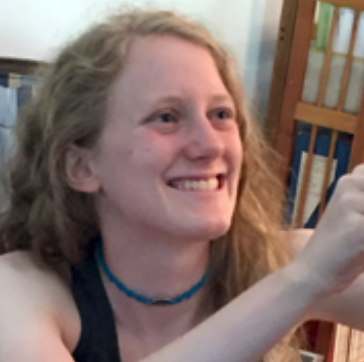 Tessa Botkin: "Measurement invariance among multi-informant assessment of fear of negative and positive evaluations: Implications for the psychometric properties of commonly used instruments".
Tessa Botkin: "Measurement invariance among multi-informant assessment of fear of negative and positive evaluations: Implications for the psychometric properties of commonly used instruments".
Faculty Mentor: Dr. Andy De Los Reyes
Tessa is a Research Specialist at UPMC Western Psychiatric Hospital.
 Vardaan Dua: “I’m Sorry, Curry & Rice Are Just Not My Thing: Online Sexual Racism as a Predictor of Body Evaluation Among South Asian and East Asian Sexual Minority Men”.
Vardaan Dua: “I’m Sorry, Curry & Rice Are Just Not My Thing: Online Sexual Racism as a Predictor of Body Evaluation Among South Asian and East Asian Sexual Minority Men”.
Faculty Mentor: Dr. Jon Mohr
Vardaan's project focused on examining online sexual racism as a predictor of body image concerns in East Asian & South Asian Queer Men. He is pursuing a Ph.D. in Counseling Psychology at the University of Tennessee Knoxville.
Vardaan is completing his Ph.D. at the University of Tennessee, Knoxville
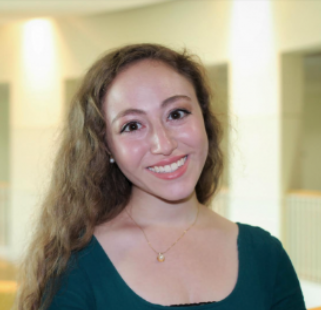 Carli Fine: "Relations Between Long-Term Memory Measures and HippocampalVolumes in Early Childhood"
Carli Fine: "Relations Between Long-Term Memory Measures and HippocampalVolumes in Early Childhood"
Faculty Mentor: Dr. Tracy Riggins
Carli investigated autobiographical memory for real-world events in 4-6-year-old children and how this type of memory relates to the lab-based Temporal Order Memory Task. She is currently a Research Technician Associate at the University of Michigan.
 Vedavalli Govindan: "The Effect of Decision-Making and Inhibition Control on the Autonomic Nervous System"
Vedavalli Govindan: "The Effect of Decision-Making and Inhibition Control on the Autonomic Nervous System"
Faculty Mentor: Dr. Edward Bernat
Vedavalli is a client advocate at the Pregnancy Clinic in Columbia, MD, which provides free services (e.g. counseling, pregnancy tests, and sonograms) to socioeconomically disadvantage and undocumented mothers. She also engages in research at Children's National Health System and with the Clinical and Cognitive Lab at University at Maryland.
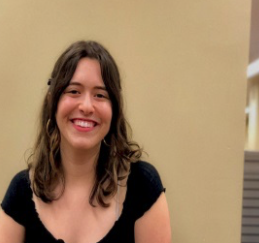 Micah Herman: “College Dating Violence: Barriers and Facilitators of Bystander Intervention”
Micah Herman: “College Dating Violence: Barriers and Facilitators of Bystander Intervention”
Faculty Mentor: Dr. Karen O’Brien
Micah's thesis aimed to update, replicate and extend a randomized controlled trial that tested the effectiveness of the STOP Dating Violence Bystander Intervention training program. Micah is a Counseling Psychology Ph.D. student at the University of Albany.
Samantha Jay: "Stability and Predictive Validity of the Parent-Child Sleep Interactions Scale (PSIS): A Longitudinal Study from Early to Middle Childhood."
Faculty Mentor: Dr. Michael Dougherty
Samantha attends UMBC's Clinical Psychology doctoral program, working with Dr. Jason Schiffman. Her research focuses on suicidal ideation and behaviors in adolescents and young adults at clinical high risk for psychosis.
 Lena Meredith: "Exploring Hippocampal Structural Differences as Children Phase Out of Napping"
Lena Meredith: "Exploring Hippocampal Structural Differences as Children Phase Out of Napping"
Faculty Mentor: Dr. Tracy Riggins
Lena investigated if hippocampal volumes and subregion volumes are related to napping in children.
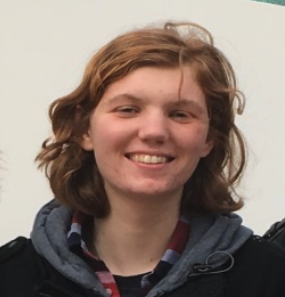 Alexandra Ostrander: "Parenting Predicts Changes in Preschool Children’s Cognitive Styles"
Alexandra Ostrander: "Parenting Predicts Changes in Preschool Children’s Cognitive Styles"
Faculty Mentor:Dr. Lea Dougherty
Alex’s research looked into depressogenic cognitive styles, specifically in preschool students. she currently works for Kennedy Krieger Institute as Behavior Data Specialist in an inpatient hospital unit for children with extreme mental and behavioral disorders.
 Nina Parekh: "Bisexual Women's Female Friendships: Predictors and Outcomes of Sexual Identity Disclosure"
Nina Parekh: "Bisexual Women's Female Friendships: Predictors and Outcomes of Sexual Identity Disclosure"
Faculty Mentor:Dr. Jon Mohr
Nina's study focused on predictors and consequences of sexual orientation disclosure in the female friendships of bisexual women. She is currently pursing a Counseling Psychology Ph.D.at the University of Akron.
Alexandra Hickey:"Exploring Gender Differences in Theory of Mind"
Faculty Mentor: Dr. Elizabeth Redcay
Alex is currently a Research Specialist at the University of South Carolina.
 Erin Hill: "Evaluating an Online Intervention to Enhance Knowledge, Confidence and Skills in Undergraduate Students’ Responses to Bereaved Peers"
Erin Hill: "Evaluating an Online Intervention to Enhance Knowledge, Confidence and Skills in Undergraduate Students’ Responses to Bereaved Peers"
Faculty Mentor: Dr. Karen O’Brien
Erin is currently a doctoral student in Counseling Psychology student at the University of Maryland.
Natania Lipp: "Bereaved College Students: The Roles of Social Support, Coping Style, Continuing Bonds, and Social Media Use in Grieving Outcomes"
Faculty Mentor: Dr. Karen O’Brien
Natania completed her doctoral studies in Counseling Psychology at Lehigh University.
 Sheetal Patel: "Developing crosscultural competencies: An innovative service learning course."
Sheetal Patel: "Developing crosscultural competencies: An innovative service learning course."
Faculty Mentor: Dr. Karen O’Brien
Dr. Patel currently practices as a Psychologist at a private practice in Washington, DC.
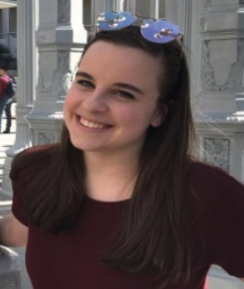 Madeleine Pekosz: "Investigating the role of body surveillance, feminist beliefs, and feminine norm adherence in women's reproductive health efficacy and behaviors"
Madeleine Pekosz: "Investigating the role of body surveillance, feminist beliefs, and feminine norm adherence in women's reproductive health efficacy and behaviors"
Faculty Mentor: Dr. Derek Iwamoto
Madeleine’s previous research projects include investigating how adherence to masculine norms relates to drinking behaviors in men, and developing an intervention plan with the goal of reducing adherence to masculine norms associated with binge drinking and negative health behaviors. She is currently pursuing graduate studies at Villanova University.
 Taylor Rezeppa: “Untrained observers’ ratings of emerging adults’ social anxiety and social skills within controlled, cross-contextual social interactions with unfamiliar peer confederates”
Taylor Rezeppa: “Untrained observers’ ratings of emerging adults’ social anxiety and social skills within controlled, cross-contextual social interactions with unfamiliar peer confederates”
Faculty Mentor: Dr. Andy De Los Reyes
Luba Roytburd: "Factors contributing to career problems in Jewish college women: The influence of attachment, separation from parents, and self esteem."
Faculty Mentor: Dr. Karen O’Brien
Dr. Roytburd currently practices as a Psychologist at a private practice in Bethesda, Maryland.
 Alicia Rozycki: "Attachment theory and women’s career development: Does relationship with mother influence daughter’s career choices?"
Alicia Rozycki: "Attachment theory and women’s career development: Does relationship with mother influence daughter’s career choices?"
Faculty Mentor: Dr. Karen O’Brien
Dr. Rozycki currently works as a Military Psychologist at Primary Care Behavioral Health.
 Nazish Salahuddin: "Predicting burnout in women’s crisis workers: The role of stress, coping strategies, and duration of service."
Nazish Salahuddin: "Predicting burnout in women’s crisis workers: The role of stress, coping strategies, and duration of service."
Faculty Mentor: Dr. Karen O’Brien
Dr. Salahuddin currently serves as Director, Undergraduate Studies and the Assistant Chair, Equity and Inclusion at the University of Maryland Department of Psychology.
 Elizabeth Sauber: "Parental stress and depression in mothers of children with ADHD: Does employment act as a protective factor"
Elizabeth Sauber: "Parental stress and depression in mothers of children with ADHD: Does employment act as a protective factor"
Faculty Mentor: Dr. Karen O’Brien
Dr. Sauber currently works as a Staff Psychologist at the Department of Veteran Affairs at the VA Palo Alto Healthcare System.
 Christa Schmidt: "Factors contributing to the research productivity of counseling psychologists: An analysis of research self-efficacy, vocational interests, gender, and research team experiences."
Christa Schmidt: "Factors contributing to the research productivity of counseling psychologists: An analysis of research self-efficacy, vocational interests, gender, and research team experiences."
Faculty Mentor: Dr. Karen O’Brien
Dr. Schmidt currently serves as an Associate Professor and as the Director of the Counseling Psychology Training Program at the Towson University Department of Psychology.
 Chandini Shah: Examining the role of self esteem and collective self esteem in the psychological health of South Asian Americans.
Chandini Shah: Examining the role of self esteem and collective self esteem in the psychological health of South Asian Americans.
Faculty Mentor: Dr. Karen O’Brien
Dr. Shah currently practices as a Staff Psychologist at the University of Maryland Counseling Center.
 Mary-Charlotte Wasserbach: "Self-Referent and Non-Self-Referent Verbalizations in Young Children: Temporal Stability and Associations with Risk Factors for Depression."
Mary-Charlotte Wasserbach: "Self-Referent and Non-Self-Referent Verbalizations in Young Children: Temporal Stability and Associations with Risk Factors for Depression."
Faculty Mentor: Dr. Lea Dougherty
Mary-Charlotte is currently pursuing a Master's degree in School Psychology at Towson University.

